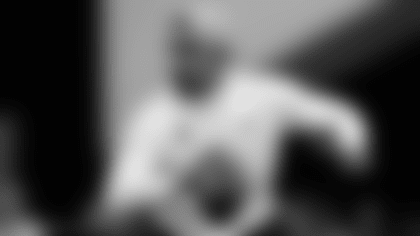Can you take us through the replay process when there's a questionable call that comes up through the booth and how does that work amongst the assistants and what's your role?
PAT SHURMUR: Yeah. If we see something upstairs, when I say we, offensive or defensive coaches, if there's something that warrants a challenge, they'll get it to me and then I'll communicate it to Coach [Kelly]. I'm assuming you're talking about the one play that came up. From our view, and we got a lot of coaches upstairs, from our view where we were sitting in the press box, we saw two feet down and there was really nothing for us that we could see with the elbow as being down.
Now, had we had the benefit of the broadcast where they were able to cut it up, certainly we would have challenged, but we don't get that. We do get some replays at times, but there are times when they're not that timely.
So you have either the broadcast or the stadium feed; is that correct?
PAT SHURMUR: We get a feed of some sort, and I can't always tell you what it is because I can't I don't know what it is. There are times when we get replays. There are times when we don't. The big board that you see in the stadium is controlled by the home team, so when there's something that's significant for the home team, a lot of times you see a lot of replays. When it's significant for the visiting team, a lot of times you don't see much.
Is that a broken system?
PAT SHURMUR: No, it's not a broken system. It's a game played, and you'd like to be able to replay it we'd like to be able to see everything. That actually was away from our bench so our bench couldn't see it great either, and the elbow came down in front of a bunch of players, so we couldn't see it.
Do you get the network feed in any of the stadiums?
PAT SHURMUR: We get the network feed but it's not always in time where you can do something about it. They're always after the fact how many of you guys saw it and said immediately we should challenge?
We all did.
PAT SHURMUR: Without the replay?
No, with the feed.
PAT SHURMUR: Right, and you could have had a different view than we had. That's where it comes in.
Do you remember what you saw?
PAT SHURMUR: We did see a replay, but it wasn't we didn't see anything on the first one we saw. We didn't see anything that we thought would be significant.
Could you have a TV in the coaches' booth that has the broadcast?
PAT SHURMUR: No, we have to roll with what is provided for us, and it's the same in both booths.
In retrospect did you have a chance to go back and look at it and would you have challenged?
PAT SHURMUR: Oh, absolutely. If we'd have gotten in a timely way, if we'd have gotten the information you all saw, we were saying what the heck are they doing, we would have challenged.
Shouldn't there be a system to get it right where the primary thing is to get it right? In college, they don't --
PAT SHURMUR: Right, but everything is timely. You're moving on to the next play or whatever, and we all understand that.
Could you hire somebody to sit in the press box and --
PAT SHURMUR: Just watch TV?
Just watch the feed.
PAT SHURMUR: Yeah, which we do, and if we'd have done it, that guy watching the TV wouldn't have been able to do anything about it because it wasn't timely. You know what I'm saying? In this instance that's what happened.
I think the confusion is that there was a minute in between plays, the clock, there was a minute in between, and the rules stipulate that you're supposed to get the network feed and it's supposed to be directed right through the truck right into you guys so there's no delay.
PAT SHURMUR: Right.
So if there's a minute of time and there's a live feed of the --
PAT SHURMUR: I understand.
What somebody else is seeing in a timely fashion, then you should be able to see it.
PAT SHURMUR: Yeah, I appreciate the update on the rules. I know the rules. But all I can tell you in this instance, we didn't get it in a timely fashion.
Now, I'm not saying there's any conspiracy here, it just didn't happen.
Do you file a complaint with the league, though?
PAT SHURMUR: No, no, none of that. None of that. We just keep playing.
Just to be clear, you were not getting the TV feed during --
PAT SHURMUR: We were getting TV feeds. In this case here we didn't get it in a timely way where we could have done anything about it. That's it. And where we were sitting in the box, and there's a lot of us coaches up there that watch the game. Now, offensively when we're on defense, I'm getting ready with the next series and helping coach put together his next series of plays, we're watching this, and then we cut back and forth. If somebody in there says, 'Hey, Pat, we've got to challenge this,' then they get me the information and I get it to coach.
I think it's confusing because we saw in that minute span, we saw a replay that showed it should have been challenged, so we were getting the feed that maybe you weren't.
PAT SHURMUR: Yeah, I can't answer that for you.
Could your son text you and say, 'Hey, dad, you've got to challenge?'
PAT SHURMUR: Why don't you guys text me? You guys get it on Twitter before that's what you could do, as well. I'm sure that's -- don't do that. (Laughter.)
When you look at the Redskins' defense, what do you see?
PAT SHURMUR: I see the same defense we played against last year, or the first time, opening game. They're actually they've got [S Brandon] Meriweather, they've got a very veteran group. They've got over 30 years of experience in the secondary. They're very veteran up front. They play extremely hard. They're very active, and I think that's going to be a challenge for us.
How did they adjust to you in the second half? They were relatively effective after the first two or three shots.
PAT SHURMUR: Yeah, I think they were trying to get a feel for how they wanted to play us. It was the first game of the year. We obviously hadn't seen each other yet, and so teams try to just change up and try to find what works, and I think they played a little bit more man. They continued to pressure, you know, and I think some of what happened is we just needed to execute a little better.
The home thing, you guys for whatever reason, you've been much more productive away. Do you vary the routine or anything? Do you change anything up just to what do you do about that?
PAT SHURMUR: I think Coach Kelly said yesterday maybe we'll get on a bus and drive around. We'll drive to Jersey and back, or I don't know. We like to we love to have a dominance at home. We found a way to win games on the road, which we all know is difficult, and we just got to come back and play better. It ain't a great answer, we've just got to play better against our opponents that we play at home.
And the reality of it is, this is a week-to-week thing, and we've got to do what we can this week to play this week's opponent and make more plays than they do, and that just happens to be the Redskins.
Were there more holes for LeSean McCoy to run through this week?
PAT SHURMUR: I don't know, I think we did a good job blocking. I think we played very physically up front. I think LeSean did a good job of running downhill. I just think it was a team effort.
Typically, when you run the ball well, you're getting good blocks. LeSean broke some tackles. He hit it up in there nice, and we got good physical play up front.
In the spring and summer could you have foreseen Nick Foles playing the way he has the last two weeks?
PAT SHURMUR: We try not to predict. I'm glad that he is. We knew he was a fine player, and we knew all along that if he got in the game he'd have a chance to be successful, and he's done it.
It's a credit to him. It's a credit to his training, and then he puts it to good use when he gets in the game.
You get this question a lot when you go from a quarterback like Michael Vick to Nick Foles. When you go from a left tackle like Jason Peters whose athleticism and strength might be unmatched in the league to Allen Barbre, does that affect your game plan of things that you try to do, because Jason's toolbox is pretty significant.
PAT SHURMUR: Yeah, I'm glad we got that question out. I thought Allen did an outstanding job. We've known all along that if he had to go in and play, because he's our primary sub at either guard or either tackle, we knew that as coaches that if he went in and played that he would play very physical and he did that.
So we didn't change the plan. We asked him to go in there and do the things that Jason does, and he did a nice job.
In terms of scheme and offensive concepts, how much has the offense changed or evolved from that week one Redskins game until now, or is it pretty much the same?
PAT SHURMUR: Well, how we run the offense is the same. You know, we've obviously incorporated more and more things. Typically after you do something for a few weeks, you kind of move on to other things, and you circle back.
And then you're always aware of the second time you play an opponent because you've seen each other and then you make adjustments.
So yeah, we've evolved quite a bit, although from a coaching standpoint what we do is very recognizable compared to week one.
What are some of the things you do with Brad Smith?
PAT SHURMUR: Yeah, you know, I'd rather comment on that if and when that deal gets done. I think he's at the what, he's at the getting a physical right now. When that's final, we'll talk about that.
You've had a lot of success with the inside zone read. It's been kind of you guys' bread and butter but there's been times where people have done a good job stopping you. How do you make it effective?
PAT SHURMUR: We called the plays, ran the plays better. I think Nick did a good job. There were a couple instances where he pulled it and got conversions on 3rd down, which is good. Nick is willing to do that. You know, and he's smart, he makes good decisions. Nick is a good decision maker in the pass and the run game, and that points to why he's got many, many touchdowns and very few interceptions, and I think the same can be said for the running game.
DeSean Jackson is on pace for a career year. What's he been doing behind closed doors that's helping now with the success?
PAT SHURMUR: Well, I think his preparation has been outstanding. I've been very pleased with what he does leading up to the games, and then in the games, he's had opportunities down the field where he's made plays. He's also caught a bunch of intermediate balls and extended it by gaining yards after the catch.
He's just playing. He's just playing hard, and when he gets his opportunities, he's making the best of them.
What does Nick need to improve upon? He keeps talking about improvement. What does he need to do that he hasn't done so far?
PAT SHURMUR: Well, we all need to improve, and I think that's the approach you want, and those are the answers we like to hear the players give. Because there were mistakes. We all made many, many mistakes in the game.
You know, I think as he gets more and more comfortable with his receivers, as we do more and more with the run game, as we ask him to make more and more decisions, I think just general quarterback play.
He's obviously not a real fast runner, but he seems to get positive yards every time he goes.
PAT SHURMUR: Right.
Is that an unusual trait? You talked about his decision making. He seems to do it at the right time and find the right way to go.
PAT SHURMUR: Yeah.
Without being fast, he gets big yards.
PAT SHURMUR: Well, and I think the decision for the quarterback, we always talk about touchdown, 1st down, get down, and I think that's what he does a good job of is get as many yards as you can. If you can score, score. If you can't score, let's move the chains and then let's get down. So he does a good job.
He's a much better athlete than people give him credit for. You know, I saw that when we were working with [Rams QB] Sam Bradford, as well.
His footwork was an issue in college. Where is he now in terms of the footwork you like to see in the pocket?
PAT SHURMUR: Well, I think he's done a good job with his footwork. And again, that goes back to getting used to their receivers, getting used to the concepts and doing it over and over and over. And I think he's a guy that steadily improves each week, and he was pretty good with his feet, moved around in the pocket pretty well. I remember one throw where he got back to Riley [Cooper] early in the game where he had to move in the pocket, clear himself and make a throw. That's one example of a guy getting back to his fourth read. We had three on the right, and he was fourth with the back being fifth, and he moved his feet and got back there.
There's examples of him doing it well. But it's just like anything; basketball players practice making free throws every day.
What has Michael Vick been able to do in terms of team meetings and contributing to the overall game plan?
PAT SHURMUR: Yeah, he's in all the meetings, and we try to get as much out of him as we can in practice. You know, he's just like any other player. He's just involved, and he's helpful, and he's a guy with a lot of experience. As I've mentioned before, I think that quarterback room is very healthy. They're in there getting the starter ready to play and doing what they can to improve.
You don't hear a lot about a guy like Evan Mathis. Can you just kind of talk about what he's meant to the offensive line?
PAT SHURMUR: Yeah, I thought he's had steady performance all year. You know, they've all played together for, what, 10 games now? He's got a lot of experience as a player, and I think he's just had kind of a steady performance to this point.
In the 2012 draft you obviously scouted all the quarterbacks. What did you think of Nick Foles coming out of college at that point?
PAT SHURMUR: We liked him a great deal. Yeah, we see why the Eagles drafted him, and it wasn't any surprise to us because he had all the attributes that I know. I know [general manager] Howie [Roseman] and I know Andy [Reid] and Marty [Mornhinweg] and those guys were looking for in a quarterback.
When you first came over as a coordinator from Cleveland, do you tend to make your system work for the players or the players fit into a system?
PAT SHURMUR: No, we've got a lot of plays, and so you've got to quickly you've got to quickly get to know your players, and then within your system try to do the things that they do well. If you think back, and this is think back to my first year in Cleveland, we did not have an offseason. So I had to quickly meet the players in the fall and then try to understand what they could do well and then move on. That's what the offseason is for, as you get to know the players, and that's why we do so much work.
What's the downside of sort of forcing a group of players into a particular system?
PAT SHURMUR: No, I just don't think that's smart. I think most coaches would agree with me on that.













